It is impossible to talk coffee in Brazil without mentioning the state of Minas Gerais, its largest coffee producer and home to some of the micro-regions that are well-known among coffee connoisseurs around the world, such as Cerrado and Mantiqueira de Minas. The name of the state comes from its mining: Minas was the epicenter of a gold rush led by Europeans in the 18th century. Coffee plantations started to spread in the 19th century, first in the central-north region and then all over the southern region as well.
If you visit Minas Gerais, chances are you are going to get invited to a hospitable native’s (mineiro) house, and the first thing they are going to do is offer you a cup of coffee. If you are lucky, it will come alongside one of the world’s greatest inventions, originally from Minas: pão de queijo, a cassava-flour-and-cheese-bread concoction. (Yes, I am a Mineira, and I can’t help but brag about our invention, one of the most delicious edible things on Earth.) Belo Horizonte, the state’s capital, is where you are going to find some of the best cheese bread in Brazil. The city is reaffirming itself as a cultural, creative, and gastronomic hub. And coffee has followed along, with many cafes now serving up regionally grown “black gold” in different extraction methods and building direct-trade relationships with Mineiro farmers. For when you visit the state, here is where to find these places.
Academia do Café
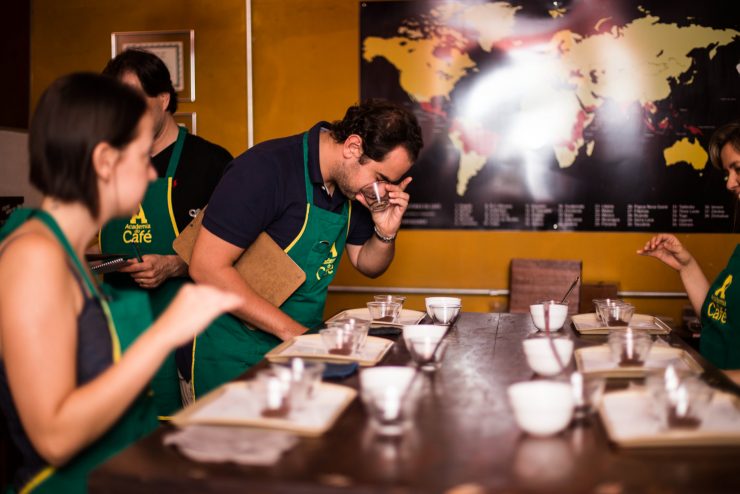
Photo by Clarissa Lanari
Academia do Café is a coffee school that holds Specialty Coffee Association of Europe-accredited coffee courses, a coffee shop, and a green-coffee sourcing center in the middle of Belo Horizonte. Founders Bruno Souza and Debora Fortini launched it as a training center in 2011, with the coffee shop being added in 2013; it is now run by their daughter and son-in-law. Souza and Fortini already had experience working with coffee importing during 10 years spent in Oregon. Upon returning to Belo Horizonte, their idea was incentivizing the specialty coffee industry in the region while providing quality coffee to Belo Horizontinos when such a thing was close to nonexistent.
The Academia folks also run a fifth-generation coffee farm, Fazenda Esperança, where they source some of their coffees, as well as buy directly from other producers. They have experience with every step of the coffee chain, which helps them to educate their customers. All espresso drinks at the cafe are double shots—something unusual in Brazil. And in the summertime—which is a large share of the year in BH—their Limãozin drink is a hit: rangpur-lime concentrate mixed with cold brew. Sweet and refreshing.
Academia do Café is located at Rua Grão Pará, 1024. Visit their official website and follow them on Facebook, Twitter, and Instagram.
OOP Coffee
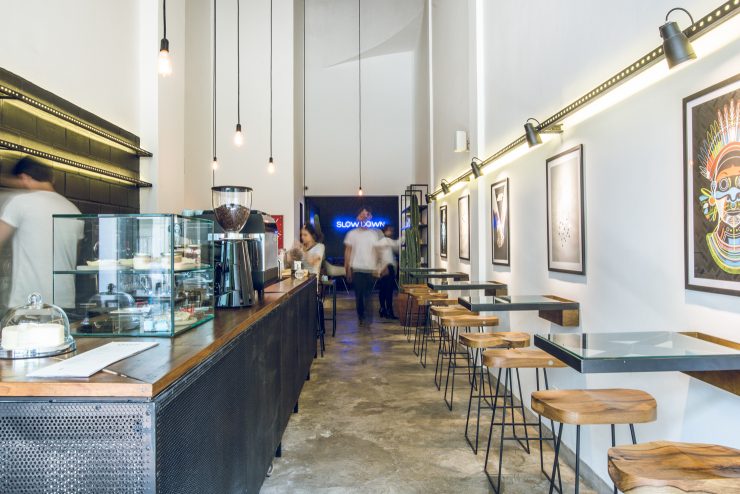
Photo by Luiza Ananias
OOP Coffee is located in the heart of the Savassi neighborhood, a busy commercial and cultural hub close to the city center. There you will probably find founders Adriene Cobra and Tiago Damasceno behind the counter serving OOP’s coffee—now roasted by Damasceno himself—and a short but delicious food list, including cheese from small producers in the state of Minas.
They run a streamlined operation, focused on coffee quality. Oop, which means “open” in Afrikaans, aims to be an open platform for local artists and suppliers—from the food offered to the art displayed on the wall. When I visited, there were five different coffee options, served on Hario V60 or AeroPress, in addition to espresso drinks. The sofa in the back makes for a welcoming slow-down area.
OOP Coffee is located at Rua Fernandes Tourinho, 143. Visit their official website and follow them on Facebook and Instagram.
Intelligenza
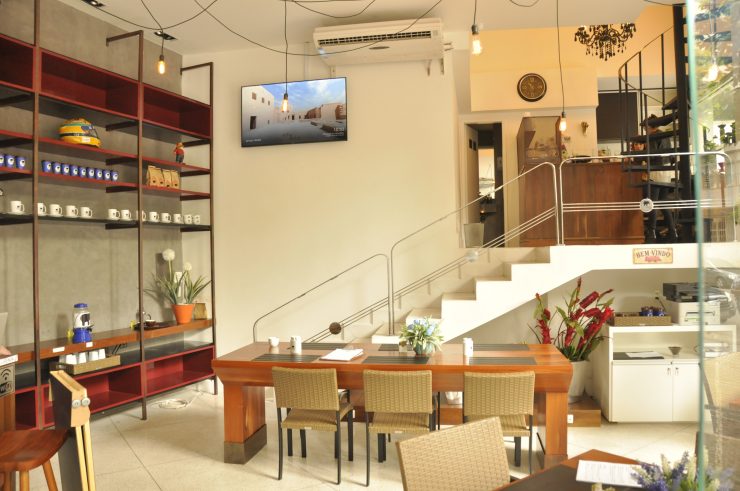
Photo by Marlon Ossiliere
While walking to OOP, I stumbled upon Intelligenza a few blocks away. In the middle of Savassi’s busy area, Intelligenza has a dedicated area for laptop workers on the third floor. There you will find large tables, free WiFi, and many power outlets—which are not so easy to find in Brazil. Henrique Fiuza, the owner, explains that since Savassi is the site of many offices, it is often necessary for people to find a quiet place to have a coffee and do some work, so he wanted to offer both.
Fiuza got inspired to open his own shop after doing consultancy work for Noete Café Clube (see below). At Intelligenza, he serves coffee via various extraction methods (V60, AeroPress, Clever, and French press, plus Toddy cold brew) and from different roasters—when I visited, Cafeteria Will Coffee and Noete were the featured roasters. When in need of a workspace and good coffee in Savassi, you know where to go.
Noete Café Clube
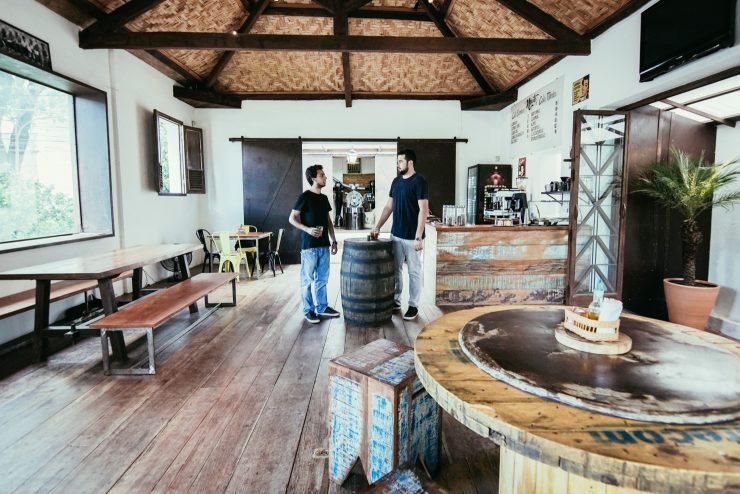
Noete was born in 2015 as a coffee roasting “club” where subscribers could get a different coffee delivered to their doorstep every month. Soon, childhood friends Guilherme Costa and Daniel Cabral wanted to bring the face-to-face coffee experience to their clients, so they opened their “casa café”—a place to relax and have good coffee and food.
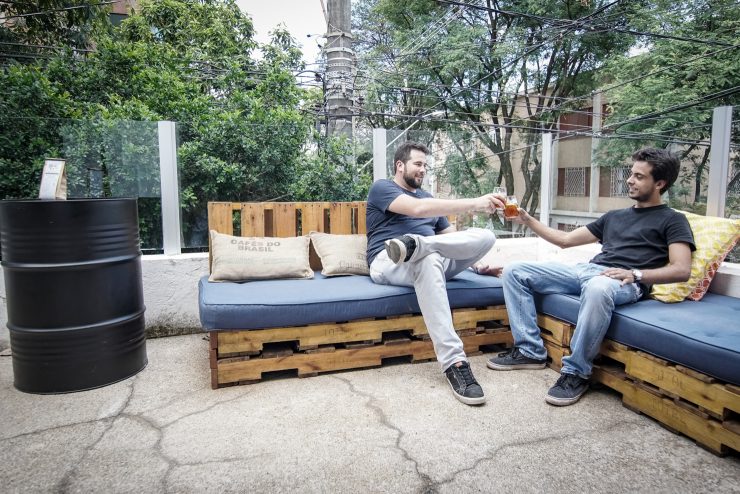
Daniel Cabral (left) and Guilherme Costa. Photos by Maria Navarro
Every week they host an event that might involve coffee plus craft beer, local cheese, cigars, or wine. They have an external area used by Cuban cigar lovers and a partnership with a nearby cigar supplier. The subscription club is still up and running, but now customers also get to try different coffees when they visit the shop. When visiting, order a pour-over (there are always three beans to choose from) and a brownie, made by Costa’s sister—to die for.
Noete Café Clube is located at Rua São Domingos do Prata, 475. Visit their official website and follow them on Facebook, Twitter, and Instagram.
A Pão de Queijaria
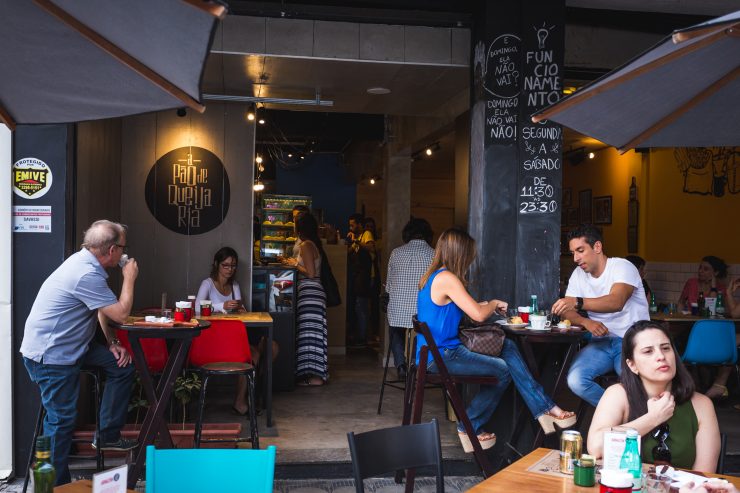
Photo by Barbara Kaucher
A Pão de Queijaria, also in Savassi, is the place to go for yummy pão de queijo. Pair it with coffee from Café das Amoras (see below), as a pour-over or in espresso drinks. Each day features a different cheese, all from artisanal producers in Minas—and as you can tell once you bite into one, there is a lot of cheese inside.
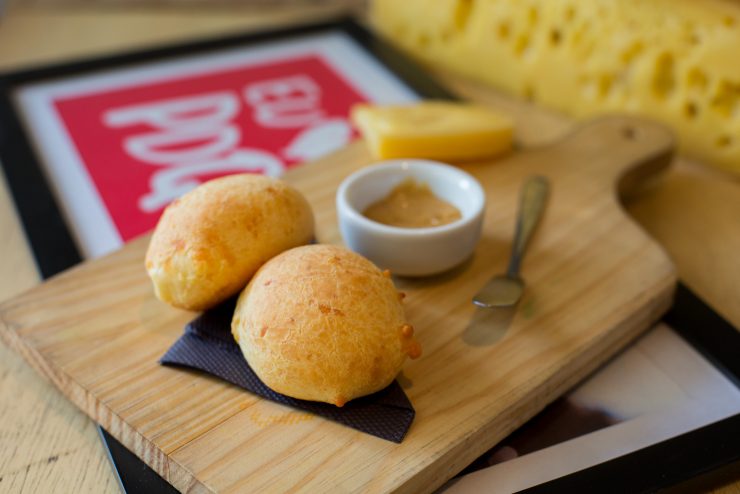
Photo by Victor Schwaner
The regular cheese bread comes with a choice of cheese sauce or espresso butter, both of which go great with coffee. If you’re in the mood for heavier fare, don’t miss the sandwiches—also made with cheese bread. The chovinista one is very traditional in Minas, pão de queijo filled with pork loin, bacon, Minas cheese, and fried collard greens—a real treat. Finish the meal with an espresso and you are good to go explore the Savassi area a bit more.
A Pão de Queijaria is located at Rua Antônio de Albuquerque, 856. Follow them on Facebook and Instagram.
Café das Amoras
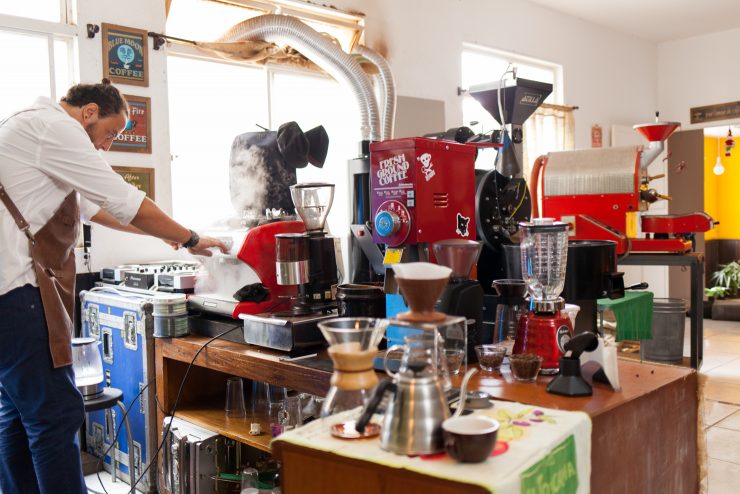
Photo by Lucas Borges
Café das Amoras is not a coffee shop per se, but it is worth being mentioned here for the work it has been doing to improve Belo Horizonte’s dining-industry coffee service. Besides A Pão de Queijaria, Café das Amoras supplies coffee to many other small cafes and restaurants in the city. Felipe Brazza, the roaster, and Gabriela Mendonça, a Q Grader (and also a dentist), source from their family farms Fazenda das Amoras and Estância Santa Luzia, both in the Minas Gerais countryside.
Brazza started roasting in 2013 on a Probatino inside the couple’s apartment. From there, the beans went into a grinder located in the middle of the living room, then delivered to a few clients. Suddenly, the building super gave them an ultimatum: the smoke was bothering the neighbors and they had 30 days to find another place for their roasting adventure. They found an ample floor in a commercial building in Savassi, and moved all the equipment there, where they have been based ever since, with an ever-growing wholesale-customer list. The couple is also thinking about opening a coffee shop in the future if the time is right. Customers don’t usually visit the roasting studio, “but if they show up,” Brazza says, “they will be very welcomed. We have an espresso machine and all extraction methods here to please them.” Why not?
Café das Amoras is located at Rua Sergipe, 1035, Sala 2. Visit their official website and follow them on Facebook and Instagram.
Juliana Ganan is a Brazilian coffee professional and journalist. Read more Juliana Ganan on Sprudge.
Top photo courtesy Luiza Ananias.
The post A Coffee Lover’s Guide To Belo Horizonte appeared first on Sprudge.

